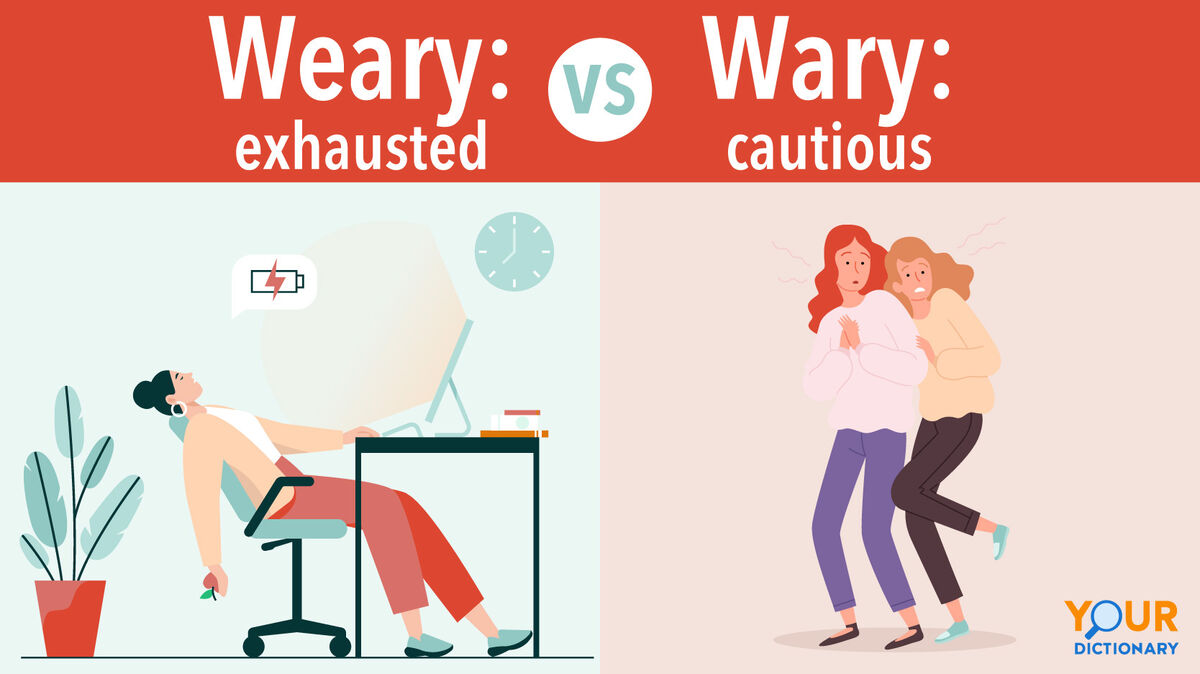
When you're driving late at night, you probably feel both weary and wary. But believe it or not, these words have two different meanings — and they're not interchangeable. Figure out whether you're feeling weary or wary in a new situation, and learn how the word leery figures into the situation.
Are You Weary or Wary?
It seems like only the letter "e" separates weary and wary. But they're pronounced differently (weary is WEER-ee, wary is WARE-ee), and the differences in their definitions make these adjectives nearly opposites.
| Word | Meaning | Example |
| weary | exhausted | I'm weary from staying up all night. |
| wary | cautious | Be wary of strangers trying to steal your identity. |
When you feel weary, you're either physically or emotionally tired. But when you feel wary, you're not tired at all — you're on high alert against potential danger.
Why Weary and Wary Are Confusing
It's easy to confuse weary and wary because they look and sound enough alike to seem like synonyms. However, using one word instead of the other can confuse your readers.
For example, saying "I'm weary of people who drive too fast" means that you're tired of fast drivers. Saying "I'm wary of people who drive too fast" means that you're very careful around fast drivers. You could be both weary and wary of fast drivers, but one word can't capture both meanings.
How to Remember the Difference Between Wary and Weary
Telling the difference between weary and wary can be tricky, which is why many people confuse them. The trick is in the words beware and aware, which both sound like wary.
- If you're wary about something that could harm you, you're thinking "Beware!"
- Someone who is aware of a possible threat is wary, not weary.
- Think of the word war. If you're at war, you'd need to be wary all the time.
- Weary has a similar meaning to the phrase "worn out." In these cases, worn is the past tense form of wear, which is present in weary.
Definition of Weary: Exhausted
Weary comes from the Old English word wergian, meaning "to become tired." You're most likely to see it used as an adjective, but it also has a verb form.
How to Use Weary as an Adjective
You can be weary in two different ways. First, you can be physically exhausted.
- The weary travelers finally boarded the airplane.
- After a hard workout, we were too weary to lift our arms.
- Oliver let out a weary sigh after reviewing the work on his desk.
You can also feel emotionally weary of an action. This usage typically comes before the word of with the same meaning as tired of. Think of it as the phrase "wearing out" or "worn out." For example:
- I'm weary of people being rude to me at work.
- Josh was weary of arguing, so he apologized.
- The country was weary of war after two long conflicts.
How to Use Weary as a Verb
When something makes you tired or bored, it's wearying you. For example:
- The long lecture wearied me almost immediately.
- Sick people can weary easily, so they need lots of rest.
- Once the dog began to weary, we decided to head back home.
Definition of Wary: Cautious
The Old English word wær, meaning "watchful," is the origin of wary. It's the same root as beware, aware and even guard.
Unlike weary, wary can only be used as an adjective. Examples of the correct usage of wary include:
- When you travel, be wary of people who follow too close.
- My dog is wary around bigger animals.
- Wary consumers are careful not to share their credit card information.
- Being a defensive driver means that you're wary around other cars on the road.
- After living in a place with lots of tornadoes, I'm quite wary about high winds.
Weariness vs. Wariness
The noun forms of weary and wary also sound quite similar. But weariness, which describes a state of exhaustion, and wariness, which refers to the state of caution, aren't the same word at all. For example:
- I gave in to weariness and closed my eyes to sleep.
- We remained in a state of wariness until we were safely back at home.
Weary vs. Wary. vs. Leery
The word leery is a synonym for wary, but the only connection it has with weary is that they rhyme. In other words, leery and wary are interchangeable, but weary doesn't fit the same meaning. For example:
- I'm leery of strangers. (I'm cautious around strangers.)
- I'm wary of strangers. (I'm cautious around strangers.)
- I'm weary of strangers. (I'm tired of strangers.)
Don't be tempted to use weary when you can't think of the word leery. When in doubt, it's best to use the word cautious or watchful instead.
Don't Weary of Grammar Just Yet
Hopefully, you'll be a bit more wary when it comes to choosing the correct word in the future. It will make writing much less wearying for you when you have a stronger vocabulary! For more tips and tricks for confusing words, check out the difference between discrete and discreet.